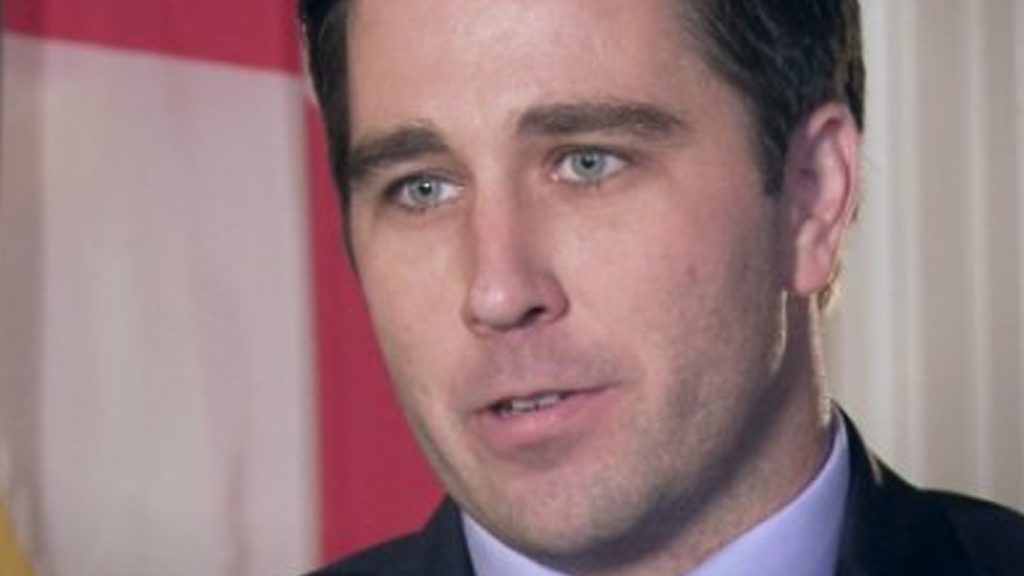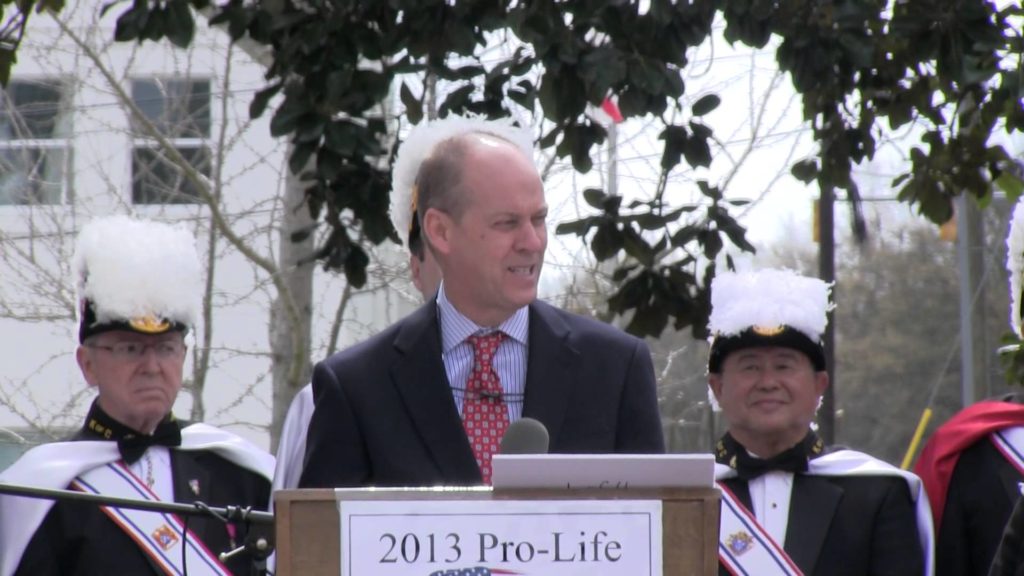Martha Roby’s former Chief of Staff nominated Assistant Attorney General

If University of Alabama School of Law graduate and Birmingham-native Stephen Boyd has any luck, his resume will grow bit longer this spring Boyd, who joined Attorney General Jeff Sessions team as the Chief of Staff in Office of Legal Policy at the Department of Justice (DOJ) back in February, was nominated by President Donald Trump on Tuesday to serve as Assistant U.S. Attorney General under Jeff Sessions. Prior to his time with the DOJ Boyd served as the longtime Chief of Staff to Alabama 2nd District U.S. Representative Martha Roby, a position he assumed when Roby was first sworn into office in January 2011. U.S. Representative Martha Roby (R-Ala.) today congratulated her former chief of staff Stephen Boyd on his nomination to serve as an Assistant Attorney General of the United States. Boyd served as Roby’s top adviser for more than six years and recently joined Attorney General Jeff Sessions at the Department of Justice. His nomination by President Trump was submitted Tuesday and now awaits confirmation by the Senate. “There is no one better suited to serve our country in this key role than Stephen Boyd. Stephen possesses a keen intellect, conducts himself with the utmost professionalism and decorum, and he works extremely hard,” Roby said of Boyd’s nomination. “Above all, the primary reason he is so well suited for this important role is this: Stephen Boyd will do the right thing. I join his wife Brecke and his parents Ron and Floranne in celebrating this special achievement.” Prior to launching Roby’s congressional office, Boyd served as Communications Director for both then-U.S. Senator Sessions and the Senate Committee on the Judiciary. Alabama U.S. Sen. Richard Shelby echoed Roby’s approval of Trump’s nominee. “Stephen is well-respected across the state of Alabama and is known for his ability to reach across the aisle and get things done,” said Shelby. “President Trump has made a great pick in nominating someone with Stephen’s level of integrity and character for this esteemed position.” Boyd currently awaits confirmation by the U.S. Senate.
Christian Coalition head Randy Brinson announces Senate run

Christian Coalition of Alabama leader Dr. Randy Brinson will be seeking the GOP nomination for U.S. Senate, another in the increasingly crowded field to challenge interim Sen. Luther Strange. The Montgomery Advertiser reports that Brinson, who also is the head of Redeem the Vote, made the announcement Monday in a Facebook post, saying he had insight into voter frustrations with “the corruption, self-dealing, and venality of politicians at all levels of our government.” “I am looking forward to working with a pre-eminent campaign team and running a modern, well-funded campaign that will draw a contrast between myself, as a voter advocate and faith leader, and the incumbent, and other career politicians running for this office,” Brinson wrote. To run for the seat, Brinson added he would resign from both the Christian Coalition and Redeem the Vote. Brinson’s advantage in the high-profile race is a connection the state’s faith-based community, but also renew questions about ties between the Christian Coalition of Alabama’s connections and the gambling industry. Brinson founded Redeem the Vote in 2003 to boost turnout among faith-based voters, claiming to have registered 78,000 voters during the 2004 presidential race. Redeem the Vote boasts a substantial mailing list, using it to bolster certain candidates. In March, the group announced a campaign to bring an “anti-corruption message” against then-Gov. Robert Bentley, who stepped down after a scandal involving an illicit affair, and Strange, who some believe received the Senate post as payment for dropping an investigation against Bentley “We have a message, it is this: we are not going to take it anymore,” Brinson told reporters at the time. The Advertiser notes that Brinson became a leader of the Christian Coalition in 2006, after a disagreement between the state and national Christian Coalition. Also, a congressional investigation in 2005 found that the group accepted $850,000 in 2000 from the Mississippi Band of Choctaw Indians, who operate casinos in that state, after moving the money through the Washington D.C.-based Americans for Tax Reform. The Christian Coalition of Alabama, under Brinson’s leadership, supported increased penalties for illegal gambling machines, while limiting electronic bingo to dog tracks in Birmingham and Mobile. Brinson said he was endorsing a bill to keep gambling contained, a move that was criticized by Christian Action Alabama, headed by former CCA director John Giles. Giles had accused gambling owners, such as Milton McGregor of VictoryLand, of trying to take over the organization. Brinson later sued Giles to recover old organization assets, a suit that was later dropped. Republican primaries for the Senate special election are Aug. 15; runoffs, if needed, will be Sept. 26. The general election is scheduled Dec. 12.
Alabama firm buys Pasco County, Florida bank for $31.3 million

Birmingham-based National Commerce Corporation (NCC) is purchasing Patriot Bank of Trinity, Florida in a deal worth $31.3 million. NCC is the parent company of National Bank of Commerce (NBC). The combined institution will have approximately $2.6 billion in assets. “We are excited to announce the merger with Patriot Bank,” said John Holcomb, NCC’s chair and chief executive officer. “We have gotten to know David Key over the past couple of years, and we are pleased to partner with him and his team in our entry into the Tampa market.” David Key, Patriot Bank president and chief executive officer, added: “We are pleased to announce our affiliation with National Commerce Corporation. We believe that our cultures are well-suited for one another and that we will be able to better serve customers in the Tampa market as part of a larger community banking organization.” Terms of the agreement include each share of Patriot Bank common stock issued and outstanding up to the effective time of the merger to be converted into the right to receive 0.1711 shares of NCC common stock and $0.725 in cash, without interest. Outstanding options to buy Patriot Bank common stock before the date of the merger will be canceled. Holders of options that are “in the money” will receive a cash payment as consideration. Boards of NCC, NBC, and Patriot Bank approved the transaction. The transaction is subject to customary closing conditions, including receipt of regulatory approvals and approval by Patriot Bank shareholders. Keefe, Bruyette & Woods, Inc. acted as NCC’s as the financial adviser to NCC; Maynard, Cooper & Gale, P.C. was its legal adviser. Raymond James & Associates, Inc. acted as Patriot Bank’s financial adviser; Smith MacKinnon, PA acted as legal adviser. National Bank of Commerce runs seven full-service banking offices in Alabama, as well as 10 full-service banking offices in central and northeast Florida (under the brands United Legacy Bank and Reunion Bank of Florida). NBC also operates two full-service banking offices in Atlanta. The company carries $1.9 billion in assets as of Dec. 31.
Alabama ranks 2017’s least gambling-addicted state

For a state that’s constantly debating whether or not to institute a state lottery as a means to generate revenue, Alabama should probably consider a new report that ranks the Yellowhammer State as the least gambling-addicted state in the country. In personal finance website WalletHub’s latest report of 2017’s Most Gambling-Addicted States, analysts found Alabama is neither gambling-friendly nor do its residents have the need to seek treatment for gambling addiction. “Gambling disorder, as the affliction is known, affects slightly more than 2 percent of all U.S. adults,” writes WalletHub. According to the Mayo Clinic, “Gambling can stimulate the brain’s reward system much like drugs such as alcohol can, leading to addiction.” “That addiction can lead to serious economic consequences,” WalletHub continued. “On a societal level, compulsive gambling costs an estimated $6 billion per year, according to a study by the National Council on Problem Gambling. Individually, a male gambling addict accumulates an average debt of between $55,000 and $90,000 whereas a female averages $15,000. Most cannot afford to pay back what they owe. As a result, gambling addicts develop a high tendency to amass even more debt, suffer from other health issues, lose their jobs, strain their relationships or even commit crimes.” In order to determine where gambling addiction is most prevalent and harmful in America, WalletHub’s analysts compared the 50 states across two key dimensions, namely “Gambling-Friendliness” and “Gambling Problem & Treatment.” Alabama ranked 47 and 45, respectively. WalletHub evaluated those two dimensions using 15 relevant metrics including: Commercial & Tribal Casinos per Capita;Gaming Machines per 1,000 Population; Share of Adults Aged 18 & Older with Gambling Disorders; Legality of Daily Fantasy Sports; Presence of Illegal Gambling Operations Gambling addiction in Alabama (1= most addicted, 25= avg.): 36th: Casinos per capita 34th: Gaming machines per capita 45th: Lottery sales per capita 43rd: Gambling-related arrests per capita 36th: Legality of daily fantasy sports Meanwhile, the most gambling-addicted state in the nation is Nevada, followed by South Dakota and Montana. Here’s how Alabama compares to the rest of the country: Source: WalletHub
Bradley Byrne urges continuation of nine mile state waters for red snapper

In December 2015, the federal government passed its annual omnibus spending bill, which included a provision to extend Alabama’s state waters from three nautical miles to nine nautical miles for 2016. The move aligned the state waters of Alabama, Mississippi and Louisiana with the state waters for Florida and Texas. On Tuesday, Alabama 1st District U.S. Congressman Bradley Byrne announced he recently sent a letter to the House Appropriations Committee urging the Committee to once again include a provision in the government funding bill to expand state waters in the Gulf of Mexico to nine miles for Red Snapper fishing. The language in the previous budget made the nine-mile extension valid through Fiscal year 2016, which ended September 30, 2016, requiring an extension to be valid in the 2017 fishing season. “As we prepare for the upcoming Red Snapper season, it is critically important that state waters remain out to nine miles,” explained Byrne. “Changing this provision just weeks before the season starts would create unnecessary uncertainty and confusion for our local fishermen.” Congressman Byrne continues to advocate for a long-term solution that gives more control over Red Snapper to the individual Gulf states instead of to the federal government. By giving states control over the data collection and stock assessments, Byrne believes we can get back to a full season again. He continued, “This solution alone is not enough to fix the larger Red Snapper issue, but continuing to have state waters out to nine miles is an important step in the right direction. I will continue working with my Gulf Coast colleagues to advance commonsense legislation that fixes this issue once and for all.” The full text of Byrne’s letter to the Appropriations Committee can be found below. Dear Chairman Culberson: As you and the Committee draft a funding bill for the remainder of Fiscal Year 2017, I urge you to include language from previous appropriations bills that extends the boundaries of state waters in the Gulf of Mexico to nine nautical miles for Red Snapper fishing. There continues to be serious concerns about the ability of the federal government to adequately manage the Red Snapper fishery in the Gulf. Efforts remain under way to find a long-term legislative solution to improve the way we gather data and information on the Red Snapper population and landings. These efforts also include a permanent extension of state waters out to nine nautical miles for Red Snapper fishing, which would bring parity to all the Gulf states. While these efforts continue, it is vitally important the Committee once again include a provision allowing for state waters to be extended. Without the inclusion of this provision, there would be great uncertainty among fishermen and access to the abundant Red Snapper fishery would be further reduced. Red Snapper fishing is about more than just the fishermen. The issue is of critical importance for the economies of coastal communities all along the Gulf Coast, including communities in my district. Ultimately, I urge the Committee to once again include this provision in any Appropriations bill as we continue working toward a permanent, long-term solution. I appreciate your attention to this critical issue.
Personnel note: Richard Shelby welcomes new Communications Director Blair Bailey

Senior Alabama U.S. Senator Richard Shelby on Tuesday announced Blair Bailey has joined his Washington, D.C. office as communications director. Previously, the press secretary for Mississippi-Republican, U.S. Senator Roger Wicker, Bailey is a native of Jackson, Miss. “Blair’s experience on Capitol Hill and extensive knowledge of issues impacting our nation’s southern states will help strengthen my efforts to serve the people of Alabama,” Shelby said in a press release. “I look forward to working with her and know she will serve as a critical part of our daily operations.” Prior to joining Wicker’s office in March 2015, Bailey spent a year working as the communications manager for the American Beverage Association where she led internal communications and worked closely with state associations from the southeastern region. She also spent more than two years assisting multiple principals at BGR Group, a Washington-based government affairs and strategic communications firm founded by former Mississippi Governor Haley Barbour. Upon moving to D.C., Bailey was a press intern in the office of Mississippi-Republican, U.S. Senator Thad Cochran after finishing her degree at the University of Mississippi.
Donald Trump’s 100-days promises: Fewer than half carried out

Sure enough, the big trans-Pacific trade deal is toast, climate change action is on the ropes and various regulations from the Obama era have been scrapped. It’s also a safe bet President Donald Trump hasn’t raced a bicycle since Jan. 20, keeping that vow. Add a Supreme Court justice — no small feat — and call these promises kept. But where’s that wall? Or the promised trade punishment against China — will the Chinese get off scot-free from “the greatest theft in the history of the world”? What about that “easy” replacement for Obamacare? How about the trillion-dollar infrastructure plan and huge tax cut that were supposed to be in motion by now? Trump’s road to the White House, paved in big, sometimes impossible pledges, has detoured onto a byway of promises deferred or left behind, an AP analysis found. Of 38 specific promises Trump made in his 100-day “contract” with voters — “This is my pledge to you” — he’s accomplished 10, mostly through executive orders that don’t require legislation, such as withdrawing the U.S. from the Trans-Pacific Partnership trade deal. He’s abandoned several and failed to deliver quickly on others, stymied at times by a divided Republican Party and resistant federal judges. Of 10 promises that require Congress to act, none has been achieved and most have not been introduced. “I’ve done more than any other president in the first 100 days,” the president bragged in a recent interview with AP, even as he criticized the marker as an “artificial barrier.” In truth, his 100-day plan remains mostly a to-do list that will spill over well beyond Saturday, his 100th day. Some of Trump’s promises were obviously hyperbole to begin with. Don’t hold your breath waiting for alleged Army deserter Bowe Bergdahl to be dropped out of an airplane without a parachute, as Trump vowed he’d do at many of his campaign rallies. China’s leader got a fancy dinner, complete with “beautiful” chocolate cake at Mar-a-Lago this month, not the promised “McDonald’s hamburger” and humble pie. But many promises were meant to be taken seriously. Trump clearly owes his supporters a Mexico border wall, even if it doesn’t end up being a foot taller than the Great Wall of China. One page of his 100-day manifesto is devoted to legislation he would fight to pass in 100 days. None of it has been achieved. The other page lists 18 executive actions and intentions he promised to pursue — many on Day One. He has followed through on fewer than a dozen, largely through the use of executive orders, and the White House is boasting that he will set a post-World War II record when he signs more this week. That’s a change in tune. “We need people in Washington that don’t go around signing executive orders because they can’t get people into a room and get some kind of a deal that’s negotiated,” he declared in New Hampshire in March 2015. “We need people that know how to lead, and we don’t have that. We have amateurs.” Efforts to provide affordable child care and paid maternity leave, to make college more affordable and to invest in urban areas have been all but forgotten. That’s despite the advantage of a Republican-controlled Congress, which the White House failed to pull together behind Trump’s first attempt to repeal and replace “Obamacare.” An AP reporter who followed Trump throughout the presidential campaign collected scores of promises he made along the way, from the consequential to the fanciful. Here are some of them, and his progress so far: ___ ENERGY and the ENVIRONMENT: — Lift President Barack Obama‘s roadblocks on the Keystone XL and Dakota Access pipelines. Done. Keystone XL is revived and construction of the Dakota Access is completed. — Lift restrictions on mining coal and drilling for oil and natural gas. Done. Trump has unraveled a number of Obama-era restrictions and initiated a review of the Clean Power Plan, which aimed to restrict greenhouse gas emissions at coal-fired power plants. — Cancel payments to U.N. climate change programs and pull out of the Paris climate accord Nope. Trump has yet to make a decision on Paris. His aides are torn. ___ ECONOMY and TRADE: — Pass a tax overhaul. “Just think about what can be accomplished in the first 100 days of a Trump administration,” he told his supporters again and again in the final weeks of the campaign. “We are going to have the biggest tax cut since Ronald Reagan.” He promised a plan that would reduce rates dramatically both for corporations and the middle class. Nowhere close. Trump has scrapped the tax plan he campaigned on, and his administration’s new package is in its early stages, not only missing the first 100 days but likely to miss a new August deadline set by Treasury Secretary Steven Mnuchin. Some details may emerge this week. —Designate China a currency manipulator, setting the stage for possible trade penalties because “we’re like the piggy bank that’s being robbed. We can’t continue to allow China to rape our country, and that’s what they’re doing.” Abandoned. Trump says he doesn’t want to punish China when it is cooperating in a response to North Korean provocations. He also says China has stopped manipulating its currency for unfair trade advantage. But China was moving away from that behavior well before he took office. Also set aside: repeated vows to slap high tariffs on Chinese imports. —Announce his intention to renegotiate or withdraw from the North American Free Trade Agreement. Backtracked, in essence. A draft of his administration’s plan for NAFTA proposes only a mild rewrite. But in his AP interview, he threatened anew to terminate the deal if his goals are not met in a renegotiation. — Direct his commerce secretary and trade representative to identify all foreign trading abuses that unfairly hurt American workers. Done. Trump has initiated plenty of studies over the past 100 days. — Slap a 35 percent tariff on goods from
Donald Trump Jr. to be guest speaker at Faulkner benefit dinner

Donald Trump Jr., businessman, entrepreneur and son of President Donald Trump, will speak Oct. 5 at the Montgomery-based Faulkner University the university announced on Tuesday. University President Mike Williams made the announcement to the press that Trump Jr. would speak at the school’s annual Annual Benefit Dinner at the Renaissance Hotel and Convention Center. “Donald Trump, Jr. is a giant in the landscape of American Business, and we are extremely excited to have him here in Montgomery,” Williams said. “We are confident that those who attend the benefit dinner will hear an incredibly memorable speech from Mr. Trump.” In the past, Faulkner has brought renowned politicians, journalists, athletes, coaches, comedians and astronauts to speak in Montgomery over the years. Faulkner chose Trump for its 75th anniversary dinner because of his experience in business and his insights from the campaign trail. “Mr. Trump is a conservative who has spent a tremendous amount of time traveling the country learning about a number of important issues including education. He is particularly excited to come to Faulkner to address their students and alumni about the need for conservative viewpoints in higher education,” Williams added. “The insight he has gained into our political system and the American people during his father’s presidential campaign will, no doubt, be fascinating and eye-opening.” Proceeds from the dinner go to support the university, as well as student scholarships. “The Annual Benefit Dinner is our biggest event each year. We love being able to share these great speakers with the River Region, but more than that, we are so excited about the scholarship opportunities this dinner provides for our students,” Williams continued. “The contributions made by the people who attend our benefit dinner are changing the lives of students at Faulkner University.” For tickets call 334-386-7257 or visit Faulkner.edu/Trump.
Donald Trump’s Mar-a-Lago loses State Department promotion posting

The State Department has removed its promotional posting about President Donald Trump‘s Florida resort, after a storm of ethics criticism. In an April 4 blog post that was republished by several U.S. embassies abroad, Mar-a-Lago was described as “Trump’s Florida estate,” where he has hosted foreign leaders. “By visiting this ‘winter White House,’ Trump is belatedly fulfilling the dream of Mar-a-Lago’s original owner and designer,” the post said. Left unsaid: Mar-a-Lago is part of Trump’s business empire. After his election, the resort doubled its membership fee to $200,000. As president, Trump has visited the property seven times, and its restaurant fills up when he’s in town. The State Department said late Monday that its intention was “to inform the public about where the president has been hosting world leaders” and that it regrets “any misperception.” That statement now appears in place of the original blog post. The White House did not respond to questions about whether it had any involvement in the original posting or the decision to take it down. The post originated on “Share America,” a State Department project. Its website describes its mission as “sharing compelling stories and images that spark discussion and debate on important topics like democracy, freedom of expression, innovation, entrepreneurship, education, and the role of civil society.” Other topics on the Share America page include a new U.S. coin honoring Frederick Douglass, debate over the Confederate flag and news about first lady Melania Trump‘s participation in the State Department’s International Women of Courage award ceremony. The Mar-a-Lago post was nearly three weeks old but gained traction Monday when several people noticed the U.S. embassy to the United Kingdom was featuring it. Sen. Ron Wyden, an Oregon Democrat, asked on Twitter why taxpayers are “promoting the president’s private country club” and referred to the incident as “kleptocratic.” Norman Eisen, who was President Barack Obama‘s chief ethics attorney, said the promotion is “exploitation.” Eisen compared it to White House counselor Kellyanne Conway‘s promotion of Ivanka Trump‘s clothing business, for which she was “counseled” but not otherwise reprimanded by the White House. “This idea of using government for private gain is metastasizing,” Eisen said. “It must be stopped.” On Twitter, Richard Painter, who served in an ethics role for President George W. Bush, called the State Department post “Use of public office for private gain pure and simple.” Eisen, Painter and other attorneys have sued Trump, alleging violation of the “emoluments clause” of the U.S. Constitution. That provision says the president may not accept foreign gifts or payments without the consent of Congress. The Trump Organization argues that this prohibition wasn’t intended to cover fair-market exchanges. Republished with permission of The Associated Press.
Legislative Medal of Honor presented to Lincoln police officer

The Alabama Legislature honored a Lincoln, Ala. police officer for exhibiting extraordinary courage in the line of duty. Zack Tutten of the Lincoln Police Department in Talladega County, has been awarded the Legislative Medal of Honor for putting himself in danger to shoot and kill a man threatening people in a convenience store with a shotgun. According to the commendation, Tutten “placed in a life-threatening situation and without a moment’s hesitation, Officer Zack Tutten placed himself in the line of peril and stopped the individual from killing or harming at least a half dozen people including the two store employees, the original assault victim, two Lincoln firefighter/medics, a civilian shopping in the store, and customers in the parking and gas pump areas of the store.” “Officer Zack Tutten demonstrated immense courage, diligence, and quick response in a life-threatening situation; his loyalty and unwavering commitment to protect and serve the residents of Lincoln, Alabama, were evidenced by his quick and proper response in protecting the lives of others.” Tutten was presented the honor on Thursday before a joint session of the legislature on the house floor in Montgomery. “Each of these nominees reminds us that law enforcement is doing amazing things to protect the lives of Alabamians every single day,” said Governor Kay Ivey at the ceremony. “All Alabamians stand in your debt.” Other 2017’s honorees include: NUMBER SPONSOR SUBJECT HJR303 Sanderford Commending Officers Wytasha Carter, Wallace Russell, Shaun Deane, Thomas Lucas, John Swinney, Marlon Tolliver, Stephen Moore, Frederick Wesley, Frank Alexander, Vonric Slaughter, and Paul Irwin of the Birmingham Police Department as nominees for the 2017 Alabama Legislative Medal of Honor for Law Enforcement HJR304 Sanderford Commending Officer Thomas C. Traylor of the Department of Conservation and Natural Resources as a nominee for the 2017 Alabama Legislative Medal of Honor for Law Enforcement HJR305 Sanderford Commending Senior Trooper Richard Daryl Bosarge, Jr., of the Alabama State Law Enforcement Agency as a nominee for the 2017 Alabama Legislative Medal of Honor for Law Enforcement HJR306 Sanderford Commending Officer Kevin Studyvin of the Fultondale Police Department as a nominee for the 2017 Alabama Legislative Medal of Honor for Law Enforcement HJR307 Sanderford Commending Officers Miles Livingston, Byron Hall, Timothy Jackson, and Cody Southwood, Sergeant John Harris, and Lieutenant Ward of the Decatur Police Department as nominees for the 2017 Alabama Legislative Medal of Honor for Law Enforcement HJR308 Sanderford Commending Officers Cory Sarvaunt and Jonathan Mitchell of the Vestavia Hills Police Department as nominees for the 2017 Alabama Legislative Medal of Honor for Law Enforcement HJR309 Sanderford Commending Agent Robbie Autery of the 17th Judicial Circuit Drug Task Force as a nominee for the 2017 Alabama Legislative Medal of Honor for Law Enforcement HJR310 Sanderford Commending Officer Tony Bryant of the Huntsville Police Department as a nominee for the 2017 Alabama Legislative Medal of Honor for Law Enforcement HJR311 Sanderford Commending Officer Zack Tutten as a nominee for the 2017 Alabama Legislative Medal of Honor for Law Enforcement HJR312 Sanderford Commending Corporal Toliver and Officer Leonard of the Irondale Police Department as nominees for the 2017Alabama Legislative Medal of Honor for Law Enforcement HJR313 Sanderford Commending Sergeant Larry Toland, Officer Zackary Davis, and Corporal Pat Sanders of the Mobile Police Department and Officer Clarence Adams of the Prichard Police Department as Nominees for the 2017 Alabama Legislative Medal of Honor for Law Enforcement HJR316 Sanderford Commending Officer Zack Tutten on receiving the 2017 Alabama Legislative Medal of Honor for Law Enforcement
Doctors to keep George HW Bush in hospital a few more days

A spokesman for former President George H.W. Bush says the nation’s 41st president will remain in a Houston hospital for a few more days of observation while he recovers from a mild case of pneumonia. Family spokesman Jim McGrath said Monday that the medical team at Houston Methodist Hospital hopes to discharge the 92-year-old Bush by the end of the week. McGrath says Bush “continues to be in good spirits and is resting comfortably” at the hospital. Bush was hospitalized April 14 for treatment of a persistent cough. Physicians say his pneumonia was treated and resolved. But he has been held while he regains his strength. Bush served as president from 1989 to 1993. He spent 16 days in the hospital in January for treatment of pneumonia. Republished with permission of The Associated Press.
Closed parks, furloughs, ‘Green Eggs’: A look at shutdowns

Disputes over spending and health care in a divided Washington have triggered shutdowns of the federal government in recent years. Republicans now control the White House and Congress, and if lawmakers and President Donald Trump fail to agree on a spending bill by midnight Friday, a shutdown of an all-GOP government would occur for the first time in modern history. A look at recent government shutdowns: CLINTON AND GINGRICH’S CONTRACT WITH AMERICA Nov. 14-19, 1995 Republicans wielding their Contract with America gained control of both the Senate and House for the first time since 1954 and Georgia’s Newt Gingrich was elected House speaker. Democratic President Bill Clinton, after the congressional midterm drubbing for his party, was dealing with the new world order. Embolden Republicans were intent on remaking Medicare, Medicaid, welfare and dozens of other programs while also cutting taxes. Clinton vetoed a resolution to temporarily fund the government because of the Medicare premium increases it contained. After five days, a deal was reached to end the shutdown, but only for a few weeks so that negotiations could take place on the various spending bills funding the government for the remainder of the fiscal year. An estimated 800,000 workers were furloughed, though they would get paid retroactively, which is the historical practice. ____ SHUTDOWN ROUND TWO AND PLANE SNUB Dec. 16, 1995-Jan. 6, 1996 The Republican-led Congress and Clinton were still at odds on six of that year’s spending bills when the short-term fix ending the first shutdown expired. An estimated 280,000 federal workers were furloughed. They eventually agreed to spending plans that enacted some of the cuts Republicans wanted, though less than they had originally sought. Republicans took a political hit for the shutdown, which closed national parks and Smithsonian museums. Undercutting the GOP was Gingrich’s comment that the hard-line stand in negotiations was due in part to how Clinton and aides treated him and Senate GOP leader Bob Dole on an Air Force One flight. Gingrich complained that Clinton didn’t discuss the budget on the return trip from Israel where they had attended the funeral of slain Israeli Prime Minister Yitzhak Rabin. Gingrich also groused about having to exit through a back door on the plane. ____ ‘GREEN EGGS AND HAM’ Oct. 1-17, 2013 Republicans who controlled the House and several Senate GOP lawmakers targeted Democratic President Barack Obama‘s health care law. Democrats who held the majority in the Senate made clear the effort was futile. The shutdown was sparked when House Republicans insisted that a temporary funding bill contain changes in the health law, the Affordable Care Act, and Obama refused. Sen. Ted Cruz, R-Texas, helped inspire the effort when he spoke on the Senate floor for 21 hours and 19 minutes in urging Congress to cut off money for Obama’s health care law. To fill some of the hours — and provide a bedtime story for his two young daughters — Cruz read Dr. Seuss’ book “Green Eggs and Ham.” But even some Republicans thought the effort was a mistake. North Carolina Sen. Richard Burr called it “the dumbest idea I’ve ever heard.” The shutdown sent approval of the GOP plummeting in opinion polls. Senate leaders brokered an agreement after the House was unable to coalesce around a Republican-only approach. Republished with permission of The Associated Press.


